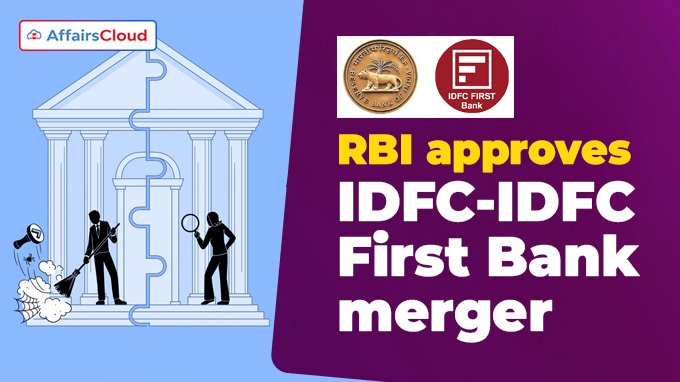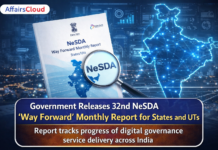
On December 26, 2023, the Reserve Bank of India (RBI) has given its nod for the reverse merger of IDFC Limited and IDFC Financial Holding Company (IDFC FHCL) with its banking subsidiary IDFC First Bank Limited.
- As part of the composite scheme of amalgamation, IDFC FHCL would first merge with IDFC and then IDFC into IDFC First Bank Ltd.
Note:
In July 2023, the Board of Directors (BoDs) of IDFC FHCL, IDFC and IDFC FIRST Bank approved the proposed Scheme under Sections 230 to 232 of the Companies Act, 2013, the Companies (Compromises, Arrangements and Amalgamations) Rules, 2016 and other rules and regulations framed thereunder, subject to other statutory and regulatory approvals.
Key Points:
i.As a part of amalgamation, an IDFC shareholder will get 155 shares for every 100 shares she/he holds in the bank.
ii.IDFC, originally an infrastructure lender since 1997, transformed into IDFC First Bank in October 2015. In December 2018, it acquired Capital First, solidifying its position as a full-service universal bank.
Click Here to Read More about IDFC-IDFC First Bank merger
RBI permits Lending and Borrowing of G-Secs
RBI has notified RBI (Government Securities Lending/GSL) Directions, 2023 in exercise of the powers conferred under section 45W of the RBI Act, 1934 read with section 45U of the Act and of all the powers enabling it in this behalf w.e.f. December 27, 2023. This decision has been taken to deepen the bond market.
- These directions will enable Lending and borrowing of Government Securities (G-Secs) in all GSL transactions., undertaken in Over-the-Counter (OTC) markets.
Eligible Securities:
i.Central Government-issued G-Secs (excluding Treasury Bills/T-Bills) qualify for lending/borrowing in GSL transactions.
- Securities obtained under a repo transaction, including through Reserve Bank’s Liquidity Adjustment Facility or borrowed in another GSL transaction are also eligible for lending in GSL transactions.
ii.Central and State Government-issued G-Secs (including Treasury Bills) qualify as collateral in GSL transactions.
- Securities obtained under a repo transaction, including through Reserve Bank’s Liquidity Adjustment Facility or borrowed in another GSL transaction are also eligible for placement as collateral in GSL transactions.
iii.Securities borrowed under a GSL transaction can be counted for SLR by the borrower, but not by the lender. Collateral received under GSL is eligible for SLR by the lender, while the borrower cannot count it for SLR.
Tenor of GSL transaction:
Minimum tenor – 1 Day
Maximum tenor- Maximum period prescribed to cover short sales in terms of the Directions on ‘Secondary Market Transactions in Government Securities – Short Selling’ dated July 25, 2018, as amended from time to time.
GSL Transactions:
All GSL transactions shall settle on a Delivery versus Delivery basis. The first leg of all GSL transactions will settle either on a T+0 or T+1 basis and transactions will settle through Clearing Corporation of India Ltd. (CCIL) or any other central counterparty or clearing arrangement approved by RBI.
Note:
It should be noted that India is set to be included in the globally tracked JP Morgan’s Government Bond Index-Emerging Markets (GBI-EM) index from June 28, 2024.
What is JP Morgan’s GBI-EM Index?
The JP Morgan GBI-EM index tracks emerging market Sovereign Bonds and is influential in the fixed income market. It Includes government bonds issued by various emerging market countries.
- It included India with its 23 bonds totaling USD 330 billion, is expected to reach 10% in the GBI-EM Global Diversified and 8.7% in the GBI-EM Global index.
- This move enhances India’s investment by attracting USD 45-50 billion over 12-15 months.
- It will also aids economic stability, lowers financing costs, and has positive impacts on sectors like corporate, banking, and infrastructure development. Challenges include market volatility, geopolitical risks, currency management, transparency demands, and tax-related concerns.
Recent Related News:
i.On October 23, 2023, the Reserve Bank of India (RBI) in consultation with the Government of India (GoI), has expanded the range of products offered through RBI Retail Direct portal by allowing retail investors to subscribe to Floating Rate Savings Bonds , 2020 (Taxable)- FRSB 2020 (T).
ii.RBI has granted in-principle authorization to MobiKwik’s payment gateway
arm Zaakpay to operate as an online payment aggregator (PA).
About Reserve Bank of India (RBI):
Governor– Shaktikanta Das
Deputy Governors– Swaminathan Janakiraman, Michael Debabrata Patra, M. Rajeshwar Rao, T. Rabi Sankar
Establishment– 1st April 1935
Headquarters– Mumbai, Maharashtra




